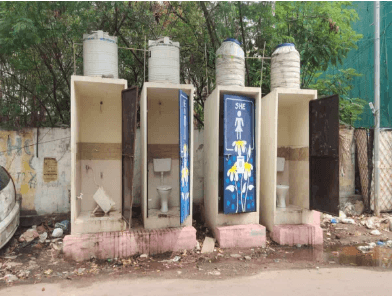Hyderabad, renowned for its strides towards Open Defecation Free (ODF+) and water sustainability, grapples with a stark disparity in public sanitation infrastructure. Despite the accolades, the city of approximately 1.2 crore residents struggles with a critical deficit of public toilets, with only 1,385 facilities operational under the jurisdiction of the Greater Hyderabad Municipal Corporation (GHMC). This translates to a staggering ratio of one toilet per 10,000 citizens, far below the ideal standard of accessibility.
The GHMC, while recently granted approval for an additional 1,857 toilets, continues to face challenges in maintaining existing facilities. Reports indicate widespread malfunctioning of toilets across key locations such as Balanagar, Mehdipatnam, Dilsukhnagar, and others, highlighting significant lapses in upkeep and operational efficiency.
The city hosts a mere 19 ‘She Toilets’, specifically designed for women, equipped with amenities such as sanitary napkin vending machines and eco-friendly utilities. However, these facilities are also subject to inadequate maintenance, often compromising hygiene standards. Activists and experts alike underscore the urgent need for robust sanitation infrastructure, suggesting a requirement of up to 10,000 fixed toilets along with 1,000 mobile units strategically positioned across Hyderabad. The proposal includes innovative solutions like small auto toilets under metro pillars, managed through centralized cleaning facilities at GHMC premises or nearby service stations.
Despite earlier initiatives such as coin-operated toilets and private-public partnerships, which saw a proliferation before the GHMC elections, a substantial portion now lies defunct due to neglect and poor maintenance practices. The sporadic installation of new facilities during election campaigns further exemplifies the inconsistent approach towards sustainable urban sanitation. In response, GHMC officials pledge to achieve comprehensive sanitation coverage, ensuring the sustainability of ODF, ODF+, and water plus certifications. However, the onus remains on effective implementation and ongoing maintenance to meet the burgeoning demand amid Hyderabad’s rapid urbanization.


